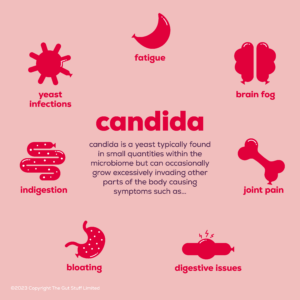candida and the gut
Updated June 2025
Candida is a yeast typically found in small quantities within the microbiome of healthy individuals. Under normal circumstances, candida is held in check by the immune system, but it can occasionally grow excessively, invading the lining of the mouth, the vagina, the skin or other parts of the body (1).
So, how does candida develop? Candida can occur due to one or more factors such as a diet high in sugar and refined carbohydrates, use of antibiotics and a weakened immune system.
Symptoms of candida overgrowth will vary person to person, and can include fatigue, brain fog, joint pain, digestive issues, indigestion and bloating amongst others.

To read more about candida, along with its symptoms and management, check out our article here. Keep reading to learn more about some of the ways you can manage candida through the gut.
how to treat candida overgrowth at home
so can we fight Candida with food?
Before we dive in, these are just some of the ways you can help to manage a candida overgrowth through the gut, always speak to a healthcare professional and ensure you have a correct diagnosis, find out more about this here.
Maintaining a healthy gut microbiome is essential for preventing and managing candida overgrowth. Research on candida and the gut microbiome is still ongoing, but there have been some exciting and more recent developments in this field.
Recent research now suggests that a gut healthy diet, that includes a wide variety of fibre rich foods, especially from vegetables, omega-3 polyunsaturated fatty acids, vitamins D and E, and probiotics and prebiotics, can help to improve the diversity of the microbiota, lead to anti-inflammatory metabolites (short-chain fatty acids) being produced and potentially reduce the abundance of fungal species in the gut. (8)
Another study, further supports this, a promising pilot study of 120 patients found those who adhered to diet modification during and after treatment of chronic candida overgrowth had more positive outcomes than those who did not (9).
Additionally, research has shown that probiotics can be effective in preventing candida overgrowth (2,3,4). Probiotics are live bacteria and yeasts that can be beneficial for balancing our gut microbiome with the good guys. When the delicate balance of the gut microbiome is thrown off, harmful bacteria and yeasts like candida can proliferate.
For example, a link has been suggested between the presence of a gut species called Alistipes putredinis and a reduction of candida in the body. A diet high in fibre and a variety of plant-based foods promotes the proliferation of this type of beneficial gut bacteria (5).
A study published in the Journal of Clinical Gastroenterology found that probiotic supplements containing Lactobacillus acidophilus and Bifidobacterium bifidum reduced the incidence of candida overgrowth.
If you’re trying to find the best probiotic for candida, be sure to find one that contains multiple strains (at least 5) and a high CFU count (colony-forming units). This means that the bacteria are more likely to establish themselves in the gut upon ingestion.
Overall, there is evidence that improving your gut health by rebalancing the bacteria and yeast in your body can help alleviate symptoms of candida, such as bloating, indigestion, fatigue, nausea, gas, and yeast infections (6).
what about antimicrobials?
Research on candida and anti-fungal foods is still ongoing, but there is some evidence to suggest that some foods have antifungal properties and they could be helpful in managing candida.
Foods that may have antifungal properties include ginger, garlic, turmeric, apple cider vinegar, and oregano. However, more research is needed to fully understand the potential anti-fungal properties of these foods.
It’s also worth noting that while some foods may have antifungal properties, dietary changes alone are unlikely to be sufficient to treat candida overgrowth alone.
Remember, the treatment for candida may require a multifaceted approach, including dietary changes, medication when necessary, and lifestyle modifications to support overall health and immune function. If you are experiencing persistent or severe candida symptoms, it’s important to consult with a healthcare provider for appropriate diagnosis and treatment.
Want to learn more about your gut and get discounted 1:1s with experts? Download our app for free! Find out more here.
References
- https://gut.bmj.com/content/70/3/595
- https://www.sciencedirect.com/science/article/abs/pii/S0168165600003758
- https://onlinelibrary.wiley.com/doi/abs/10.1111/myc.12116
- https://academic.oup.com/lambio/article/48/3/269/6700839
- https://www.nature.com/articles/s41396-020-00848-z#Sec13
- https://pubmed.ncbi.nlm.nih.gov/25786900/
- https://academic.oup.com/cid/article/62/9/1143/1745140
- https://pmc.ncbi.nlm.nih.gov/articles/PMC10302699
- https://www.sciencedirect.com/science/article/abs/pii/S1156523318300969




